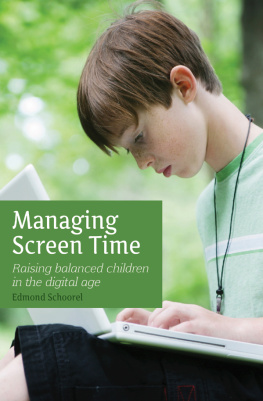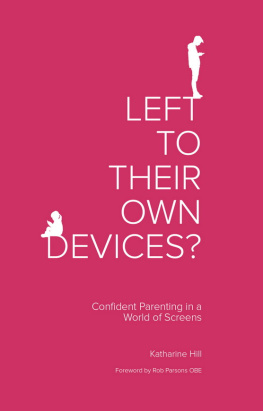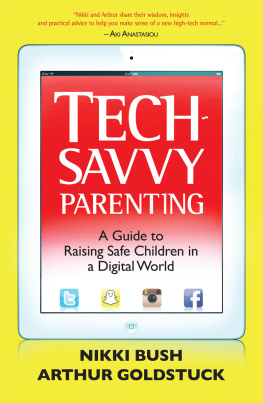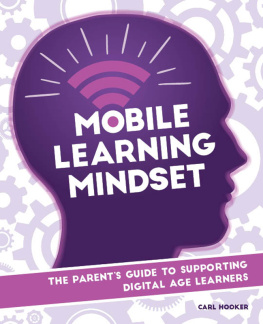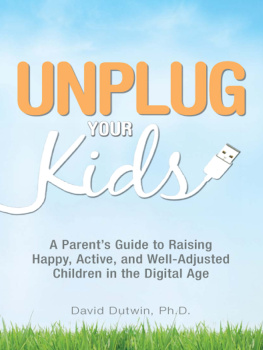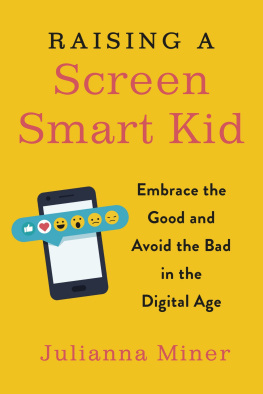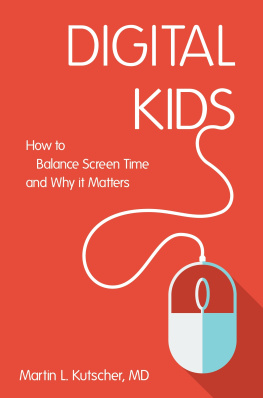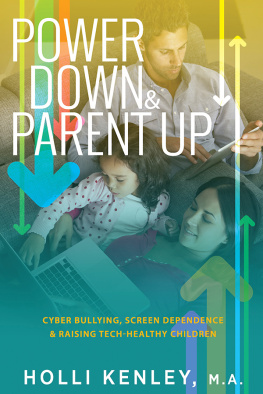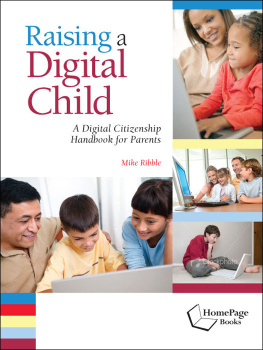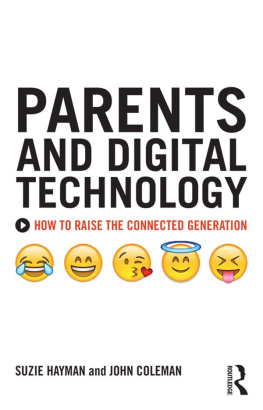Managing Screen Time
Raising balanced children in the digital age
Edmond Schoorel

Contents
Prelude
Who am I? Who are you?
Dear Reader,
Let me begin with a question: Who are you? To answer this, lets start by thinking about how you were raised. After all, were partly a product of our upbringing. What role did electronic and digital media play in your upbringing? How much do you owe to television, telephones, the internet, social media, the apps on your iPhone or tablet? Or did your parents, and perhaps your teachers and friends, have a stronger influence on you?
The best way to look closely at who you really are is to look back at who played a key role in your upbringing. To do this effectively, it helps to ask this question as if you were an involved outsider, rather than the insider that you are. Perhaps you find you learned a lot from one particular teacher but very little from another. Try again, this time without sympathy or disapproval. What did you really learn from this person? Which part of you has become the way you are because of this person?
After you have tried this mentally with a few people, look in this same way at television and digital media. Do you notice a similar influence? Television and (depending on your age) digital media have probably played an enormous role in your upbringing. They have determined, in part, who you are.
How do you think todays kids will answer this question? Some children in the West devote more time to digital media than to sleeping and eating and much more time than to school and homework. Adults in the West spend more time looking into the eyes of television stars than into those of their own partner. Many parents have given up trying to know with whom and with what their kids are in contact in the digital world. Children raise one another that was always the case; children are being raised by digital media that is new.
If youre comfortable with the fact that our children and grandchildren, students and clients are being raised by digital media, please read on. I will show you an additional task thats required in parenting: a job you cannot leave to the media but will have to manage yourself, namely allowing children to become themselves as human beings.
If you feel uncomfortable with the fact that modern children are increasingly being raised via screens large and small, please read on. Youre right: there are serious side effects. And if children are to become themselves, we need to include an extra task in our parenting to combat these side effects, a challenge as new as the screens themselves.
Its not a case of reacting against the mainstream, as Rudolf Steiner and Ita Wegman wrote in their basic book on anthroposophical medicine. Anthroposophy aims to offer perspectives that broaden the field of study, while not detracting from the value of accepted medicine (and other disciplines).
This is also true of modern developments surrounding the digitisation of society. We live in a digital age and we can gratefully make use of the possibilities this offers. But nothing should prevent us from facing the side effects of digital media or from taking the necessary measures to neutralise them.
In the first four chapters of this book I outline the effects of digitisation in our world. The world has changed, people have changed, the role of parents has changed and all of this with great speed and astonishing pervasiveness. The consequences are significant and to a large extent cannot yet be foreseen. Digital media play a role in the formative process of becoming human beings. Millions of people are the way they are as a result of the influence of television, computers, tablets, smartphones, and so forth. Millions experience problems as a result: headaches, shoulder and neck complaints, obesity, stress, sleeping problems, loneliness, aggression and memory loss.
Surely no one would choose these complaints voluntarily? So why does it happen? What interests are at work in the world of multimedia? Chapters 5 to 9 deal with the questions: What lies behind this phenomenon? Whats actually happening? I try to answer by exploring the themes of image and virtual.
The final chapters contain advice both for those who are comfortable with our modern use of digital media and for those with a more critical attitude.
Chapter 1.
How Digital Media Are Changing the World
Whatever happened to the friendly paperboy, who cheerfully passed the time of day while delivering newspapers? This role has largely been relegated to the realm of nostalgia. Even personal letters have been replaced by emails and our letterbox replaced by an inbox, containing dozens of emails each day that we dont have time to read. When we go on holiday we can ask neighbours to make sure our letterbox doesnt get clogged up. At least this encourages us to talk to our neighbours for once. Fortunately we can programme our electronic mailbox to automatically delete emails.
We no longer need newspapers to be delivered to our door. Within a few minutes, or at most a few hours, we can be abreast of everything thats going on in the world especially if there was a microphone or camera nearby, which is almost always the case, because any self-respecting mobile phone today has both. When were listening to the radio or surfing the internet, sounds and sights from the other side of the world force themselves upon us. The news finds us; we dont have to look for it.
Of course, we cant be aware of everything that happens in the world. But who determines which events from our global village arrive on our doorstep? We can choose the TV channel, radio station or website, which makes some difference, at least to the tone in which reports are presented: biased or neutral, in depth or brief, with or without background music. But do we have a real understanding of why there are reporters in certain parts of the world and not in others?
And how much news can we bear? We see and hear other peoples misery, we want to help, we want to do something, but how? We can send money to charities providing relief in Syria, Afghanistan, Sudan, Gaza or Ukraine. A drop in the ocean, the realist in us says. Or we can do battle on the right side, says our inner crusader. Or shall we pray for them, for all those perpetrators and victims and the families of perpetrators and victims? Then wed be praying all day long. Or should everyone solve their own problems and seek peace and justice in their own small world, the best they can?
The global village has enormous consequences for our moral choices. Digital media, especially social media, have been decisive in the dissemination of social revolutions and popular revolts all around the world. The election of Obama as President of the USA, the overthrow of old regimes in North Africa and the rise of the so-called Islamic State in Iraq are examples of this. Who would have imagined we could contribute to such worldwide events and movements from our own doorstep.
Infrastructure
The earth has acquired a different complexion. How romantically charming old telephone wires and electricity lines now seem, although they were, of course, also products of a technological culture. But they stand in the landscape. Swallows and sparrows give them an almost photogenic appearance. Wind Turbines and huge modern pylons are by comparison horizon-polluting junk, and there have been claims that they can impose a risk to the health of those that live nearby to them.
Wherever possible we have put electric cables under the ground, out of sight. There they lie next to sewers, which take our waste to treatment plants. Once in a while when the street is dug up for the umpteenth time so the umpteenth provider can put its cables next to the rest, we can see how many pipes and cables lie underground. Imagine a map of our country showing all the sewers, pipes and cables: that would give us a clearer sense of what the earth has to endure from all our waste and information streams.

